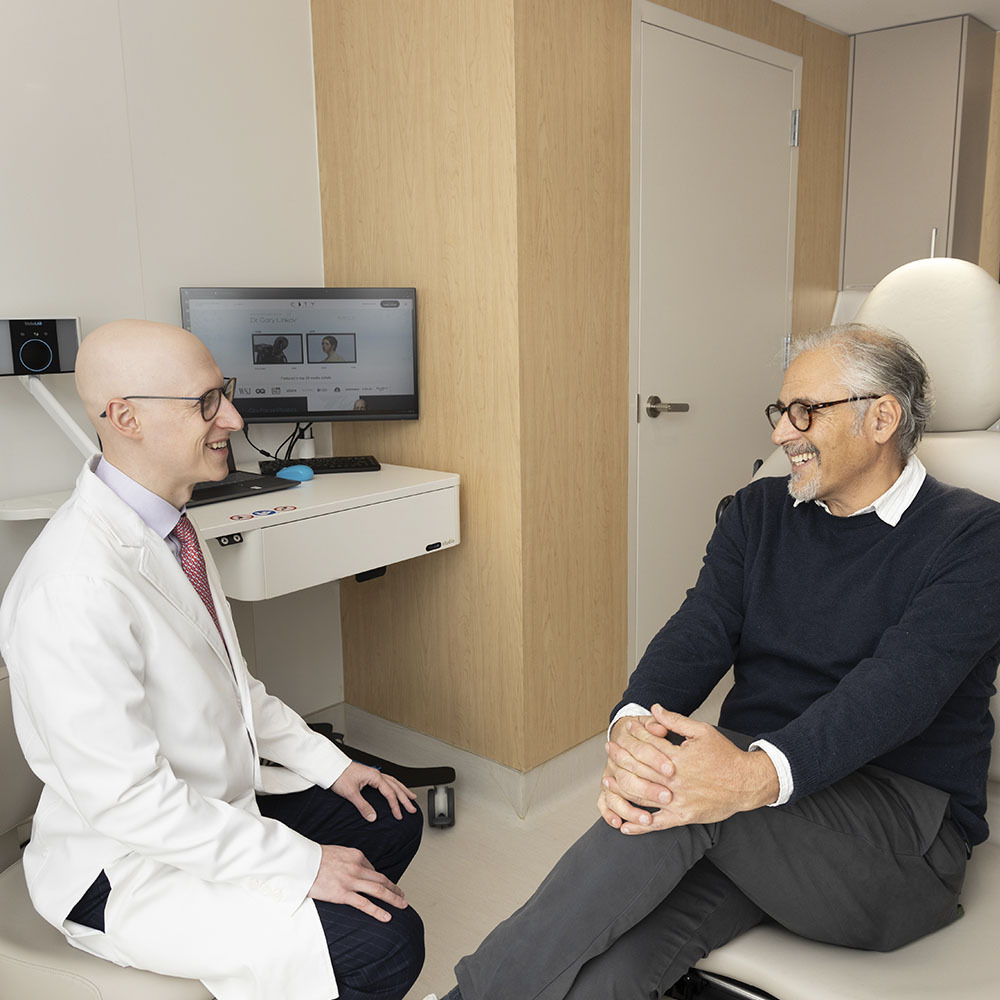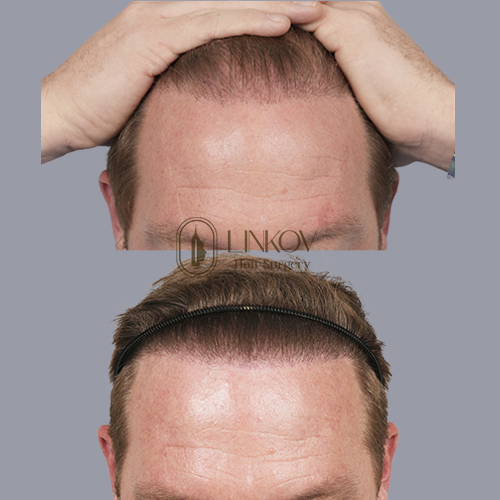Best Hair Loss Treatments in NYC
If you’re suffering from hair loss, whether it’s male pattern baldness or female pattern hair loss, you have the option of seeking out hair regrowth treatments. Medical research into hair regrowth treatments has advanced in recent years to the point where they’re both safe and effective. While there may not be a preventative cure for baldness, you can find hair treatments to stimulate your hair growth. When you’re worried about losing your hair, call Linkov Hair Surgery in Manhattan for the latest and best hair loss treatments. They know how to stop hair loss effectively.

What Constitutes a Hair Loss Treatment?
Hair loss treatment comprises not only hair growth medications, but also surgical and non-surgical procedures to stop your hair from falling out. On average, people lose 50 to 100 hairs per day. The problem becomes noticeable when your hair regrowth process slows down, leaving you with thinning hair or bald spots. With hair treatments, you observe improvements in both the density and quality of your hair.
Both genders suffer hair loss, especially those over the age of 35. At our center for hair restoration in New York City, an experienced hair doctor like Dr. Gary Linkov diagnoses male pattern baldness and female pattern hair loss, among the many other hair loss conditions. Get the best hair loss treatment in NYC from experts who employ the most innovative technologies.

What Are the Best Hair Loss Treatments in Manhattan?
Every head of hair requires customized hair loss solutions, because the source of your hair loss may be very different from that of others. Treating hair loss from a genetic factor requires a different approach than treating it from a specific disease. When it comes to stopping your hair loss and regrowing your hair, there is no one-size-fits-all solution.
It isn’t uncommon, therefore, for your NYC hair loss doctor to recommend a combination of treatments to stimulate your hair growth. Microneedling, for example, has a better success rate when combined with minoxidil and platelet-rich plasma (PRP) therapies.
For your baldness cure, your hair restoration expert may recommend that you try one or more hair treatments that may include:

Minoxidil This medication, often sold under the brand name Rogaine, has become the go-to treatment for both men and women. To stimulate hair growth, it suppresses hair loss and strengthens hair strands. It was originally developed to treat high blood pressure
Finasteride This medication is often prescribed for an enlarged prostate gland, but it works effectively for hair regrowth as well
Spironolactone This is another medication that delivers improved results in follicular density while reducing your hair loss. It’s especially effective for women
Nutraceuticals It also decreases hair loss and increases hair growth
Microneedling This procedure uses tiny needles to prick your scalp, stimulating blood vessels and hair follicles
Corticosteroid injections This in-office procedure is effective in suppressing the symptoms from autoimmune conditions that cause hair loss.
PRP injections This treatment uses your own blood, which is extracted and purified. Then it’s injected into your scalp to stimulate the deeper dermal papilla cells in the hair follicles
Stem cell therapy A relatively new technique, stem cell therapy uses ready-made growth factors from your own body to regenerate your hair follicle cells
Exosome therapy This is an innovative technique that introduces exosomes into your scalp to restore hair follicles and induce hair growth
Laser therapies Using laser energy to promote hair growth is safe for both men and women. This hair loss treatment increases the circulation of blood, stimulating your hair follicles
Hair cloning This ingenious restorative method artificially grows the germ cells of health hair follicles in a lab. Then your hair restoration specialist implants them into your scalp
Scalp micropigmentation SMP, as it’s known, is more of an aesthetic treatment. It gives you the semblance of fuller, thicker hair by injecting cosmetic dye or pigmentation into your scalp where your hair is thin
Hair replacement systems or wigs Designed for comfort and appearance, the newest wigs, hair pieces and toupees use advance technology to enhance the wig wearing experience. They precisely match your hair color and texture to completely blend with your natural hair.
For severe cases, your hair specialist may recommend a hair transplant for men or for women. The procedure may be done either via follicular unit extraction or follicular unit transplantation. When you desire the hair you used to have, go to the medical practice that celebrities trust: Linkov Hair Surgery.
Patients Talk About Their Hair Loss Treatment Experience
Why Am I Losing My Hair?
The quality and quantity of your hair is directly related to external and internal factors. Your environment has an effect, as does the water you use to wash your hair. Desalinated water strips the protective shield from your hair, making it prone to breakage. The type and strength of the shampoos and other hair care products may also weaken it.
Hair loss is also related to certain medical conditions. Their effect may be temporary or permanent, depending on the disease.
Hair loss conditions include:
- Polycystic ovary syndrome
- Cancer and cancer treatments, such as chemotherapy and radiation
- COVID-19
- Lupus
- Diabetes
- Anemia
- An autoimmune disease
A hormonal imbalance may lead to additional medical issues, such as a thyroid imbalance or a vitamin D deficiency. Women often experience hair loss during pregnancy. Stress is a contributing factor in hair loss. And after the birth, women who experience postpartum depression may lose more hair.

Hair Loss Treatment Near Me: Promote Hair Growth by Boosting Its Health, Thickness, and Strength at Linkov Hair Surgery
Are you troubled by hair loss and seeking a more youthful or authentic look that boosts self-confidence? Opt for a reconstructive plastic surgeon who is board-certified and utilizes cutting-edge hair restoration methods.
How To Find a Specialist Offering Hair Loss Treatment in Your Area
If you’re seeking treatment for hair loss nearby, here are a few tips:
- Reach out to friends and family for recommendations.
- Search online for “hair loss treatment near me,” “treatment for hair loss near me,” or “hair treatment for hair loss near me.”
- Read reviews of local hair transplant surgeons online and schedule consultations to get to know their practice.
Dr. Gary Linkov, a board-certified surgeon by the American Board of Otolaryngology–Head and Neck Surgery, boasts over 11 years of experience. His expertise lies in hairline adjustments for improved facial harmony, as well as performing both FUT (strip harvesting) and FUE procedures with precision and care.
If you’re considering non-surgical approaches, Dr. Linkov offers a combination of treatments to stimulate your hair growth, including microneedling, minoxidil, and platelet-rich plasma (PRP) therapies. Dr. Linkov’s commitment to honesty and thorough patient communication has earned him appreciation from patients who value his attentiveness and natural-looking results.
What Type of Hair Loss Do I Have?
Androgenetic alopecia is a hereditary condition that affects more than 50 million American men and 30 million American women. Yet your hair loss cure may be different from others because it depends on the type of hair loss you’re suffering from. You need to be assessed by a specialist before receiving any hair regrowth treatment. The types of hair loss include:
- Alopecia areata
- Anagen effluvium
- Central centrifugal cicatricial alopecia
- Cicatricial alopecia
- Discoid lupus erythematosus
- Dissecting cellulitis of the scalp
- Folliculitis decalvans
- Frontal fibrosing alopecia
- Hypotrichosis
- Lichen planopilaris
- Loose anagen syndrome
- Telogen effluvium
- Tinea capitis
- Traction alopecia
- Trichotillomania
If you’re losing more hair than you used to and the results are becoming noticeable, seek the best NYC hair loss treatment. Nearly 21 million women try hair loss treatments every year, while another 35 million men want hair loss treatments. The exact nature of the treatments you receive depends entirely on your hair condition and what you want to accomplish.
Am I a Good Candidate for Hair Loss Treatments?
Hair loss that’s associated with an underlying condition is difficult to diagnose without professional help. Your hair doctor has the experience and knowledge to diagnose your condition before suggesting an appropriate treatment plan. You may need a full hair transplant, or a more modest hairline lowering or forehead reduction.
Before you seek hair loss treatment, make sure you have realistic expectations and the dedication to follow through. To reach a successful result, your doctor may recommend several months of treatment sessions involving a combination of procedures. Contact Linkov Hair Surgery to get the best hair care and discrete service. In most hair loss cases, the faster you get treated, the greater your chances for a full recovery from your hair loss.
Linkov Hair Surgery
150 E 56th St, #1A
New York, NY 10022
(212) 970-9404

